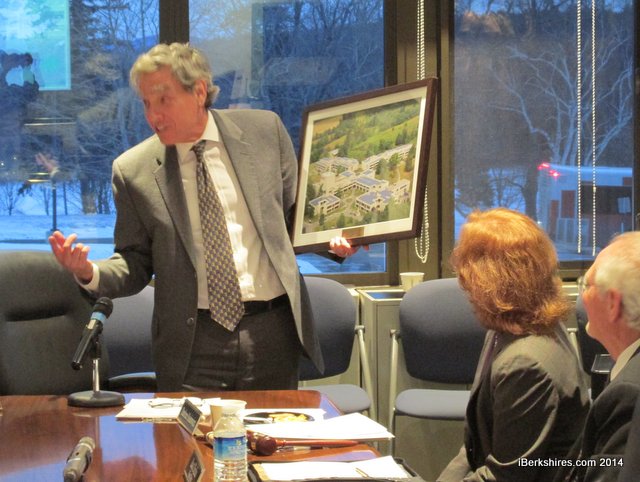
Higher Ed Commissioner Charges BCC To Make Best Use of State Funds
 Commissioner Freeland, right, said BCC is ahead of the curve in documenting student achievement. Commissioner Freeland, right, said BCC is ahead of the curve in documenting student achievement. |
PITTSFIELD, Mass. — Department of Higher Education Commissioner Richard Freeland wants Berkshire Community College to help him prove that the state's priority on education is worth it.
Freeland addressed the BCC Board of Trustees on Tuesday, calling on them to give him the "ammunition" he needs to show the administration that increases in higher education funding is money well spent.
"At the end of the day, as important as hard work is and as important as our efforts are, what really is the ultimate test is 'what's the numbers? What's the outcome? What result are we achieving?'" Freeland asked the trustees.
Last year, the state allocated the more money toward education than ever before and the governor's budget this coming year places emphasis on education. Freeland called Gov. Deval Patrick's budget "very generous"; the governor's fiscal 2015 budget calls for $68.4 million in new funding for higher education.
"I think we have lots to be grateful for in terms of how we are being viewed by the state and a lot to be thankful for with this governor. I think it is a good moment for community colleges in terms of recognition," Freeland said.
But with that increased priority comes a greater need to follow through to sustain investment. While many departments can plead their case as to why they need additional funds, Freeland is calling on the state's colleges to show the proof.
"If there is one thing we know, if we are going to get this kind of investment, there are going to be questions about 'where is the return?' The Legislature needs to be practical about that and they are not prepared to give us more money just because we need more money, which we do," Freeland said.
"The return on investment for our work is particularly compelling. So if we can show that we are gauging the kind of outcomes we are talking about — higher college completion rate, higher levels of student learning, combining our programs with workforce development, reaching out to our K-12 to make more schools come into our system ... ."
To best do so, he is calling on the trustees to align their visions with those of the state, so that the entire community college system is speaking with a uniform voice, he said. Particularly the state is looking to gauge those outcomes as well as increase collaboration among the public colleges.
He asked that when the school goes through its strategic planning, officials try to match it with the state's goals.
BCC, he said, is already ahead on the curve for outcomes by already implementing a "dashboard" that measures outcomes such as postgraduation employment, graduation rates and other student achievement categories. With that system in place, the school is now able to find strengths and weaknesses and place emphasis on the categories that need improvement.
|
The BCC Board of Trustees gave Freeland and updated photograph of the college after last year's funding allowed for multiple renovation projects. |
"You are one of the very few campuses that are already doing that," Freeland said.
Those assessments have already shown that the school ranks above state average in student success rates. But, the college needs to work on moving students from remediation courses to full instruction, a measurement in which BCC is below average.
The other major aspect Freeland wanted to tell the board was about collaboration. He said the biggest problem he has in meetings with administrations about funding is the efficiency of the dollars spent.
"We don't have great credibility on that point," he said.
Fifteen of the state's community colleges are small compared to other states and they all carry the costs of administration and campuses. But, there are ways — such as group energy purchases or information technology services — to make improve the efficiency of those dollars.
The state formed the Office of Trustee Relations just over a year ago, Freeland said, which helps communicate the expectations of the state to the colleges, bring the colleges onto the same page and assist with issues. Now Freeland wants the state's entire system to work together in showing that Patrick wasn't wrong in investing in the system.
"One of my goals is to communicate that we are at a great moment of opportunity in the state in terms of heightened level of support," he said, later adding, "give us the ammunition we need to make the case for community colleges."
Tags: BCC, higher education,
















